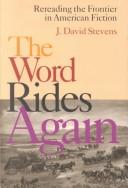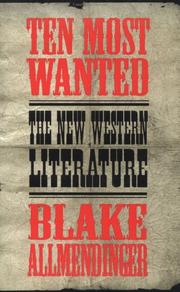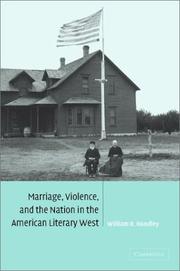| Listing 1 - 9 of 9 |
Sort by
|
Book
Year: 1968 Publisher: New Haven (Conn.) : Yale university press,
Abstract | Keywords | Export | Availability | Bookmark
 Loading...
Loading...Choose an application
- Reference Manager
- EndNote
- RefWorks (Direct export to RefWorks)
Remington, Frederic, --- Roosevelt, Theodore, --- Wister, Owen, --- West (U.S.) --- United States --- Civilization. --- Civilization
Book
ISBN: 1552387526 1552385299 1552385280 Year: 2015 Publisher: Calgary, Alberta : University of Calgary Press,
Abstract | Keywords | Export | Availability | Bookmark
 Loading...
Loading...Choose an application
- Reference Manager
- EndNote
- RefWorks (Direct export to RefWorks)
Before Owen Wister's publication of The Virginian in 1902, the image of the cowboy was essentially that of the dime novel. This title details the evidence that Everett Johnson a cowboy from Virginia who had been a friend of Wister's in Wyoming in the 1880s, was the initial and prime inspiration for Wister's cowboy.
Cowboys --- Frontier and pioneer life --- Cowboys in literature. --- Cowboys in popular culture. --- Social life and customs. --- History. --- Johnson, Everett, --- Wister, Owen,
Book
ISBN: 0292720653 Year: 1968 Publisher: New Haven and London : Yale University Press,
Abstract | Keywords | Export | Availability | Bookmark
 Loading...
Loading...Choose an application
- Reference Manager
- EndNote
- RefWorks (Direct export to RefWorks)
Art, American --- Art, American --- Art américain --- Art américain --- Remington, Frederic, --- Roosevelt, Theodore, --- Wister, Owen, --- Knowledge --- West (U.S.) --- West (U.S.) --- United States --- Etats-Unis (Ouest) --- Etats-Unis --- Civilization. --- Civilization --- Civilisation --- Civilisation
Book
ISBN: 9780230120310 Year: 2011 Publisher: New York [etc.] Palgrave Macmillan
Abstract | Keywords | Export | Availability | Bookmark
 Loading...
Loading...Choose an application
- Reference Manager
- EndNote
- RefWorks (Direct export to RefWorks)
Book
ISBN: 0195073053 Year: 1992 Publisher: New York Oxford Oxford University Press
Abstract | Keywords | Export | Availability | Bookmark
 Loading...
Loading...Choose an application
- Reference Manager
- EndNote
- RefWorks (Direct export to RefWorks)
Etats de l'Ouest (Etats-Unis) dans la littérature --- West [U.S.] -- in literature --- West [U.S.] in literature --- Westelijke staten (Verenigde Staten) in de literatuur --- Western films --- Western stories --- History and criticism. --- History and criticism --- Grey, Zane --- Criticism and interpretation --- Wister, Owen

ISBN: 0821414178 0821414186 Year: 2002 Publisher: Athens Ohio university press
Abstract | Keywords | Export | Availability | Bookmark
 Loading...
Loading...Choose an application
- Reference Manager
- EndNote
- RefWorks (Direct export to RefWorks)
Cather, Willa Sibert, 1873-1947. Death comes for the Archbishop --- Landontginners en pioniersleven in de literatuur --- Vie des défricheurs et des pionniers dans la littérature --- American fiction --- Frontier and pioneer life in literature --- Western stories --- History and criticism --- Harte, Bret --- Criticism and interpretation --- Twain, Mark --- Waters, Frank --- Wister, Owen --- Zitkala-Sa --- Ridge, John Rollin

ISBN: 0415914639 Year: 1998 Publisher: New York, N.Y. Routledge
Abstract | Keywords | Export | Availability | Bookmark
 Loading...
Loading...Choose an application
- Reference Manager
- EndNote
- RefWorks (Direct export to RefWorks)
American literature --- anno 1900-1999 --- USA: West --- Canon (Literature) --- Canon (Literatuur) --- Canons littéraires --- Etats de l'Ouest (Etats-Unis) dans la littérature --- Literaire canon --- West [U.S.] -- in literature --- West [U.S.] in literature --- Westelijke staten (Verenigde Staten) in de literatuur --- West (U.S.) --- History and criticism --- 20th century --- Western stories --- Wister, Owen --- Criticism and interpretation --- Ridge, John Rollin --- Wallace, Lewis --- Lynch, David --- Murieta, Joaquin --- Whiteley, Opal

ISBN: 110713451X 128016140X 0511120818 1139148370 0511061021 0511054696 0511308299 0511485522 0511069480 9780511061028 9780511069482 9780511120817 9780521816670 052181667X 9786610161409 6610161402 9781139148375 9780511054693 9780511308291 9780511485527 9780521093422 0521093422 Year: 2002 Publisher: Cambridge, UK New York Cambridge University Press
Abstract | Keywords | Export | Availability | Bookmark
 Loading...
Loading...Choose an application
- Reference Manager
- EndNote
- RefWorks (Direct export to RefWorks)
In Marriage, Violence and the Nation in the American Literary West, William R. Handley examines literary interpretations of the Western American past. Handley argues that although scholarship provides a narrative of western history that counters optimistic story of frontier individualism by focusing on the victims of conquest, twentieth-century American fiction tells a different story of intra-ethnic violence surrounding marriages and families. He examines works of historiography,as well as writing by Zane Grey, Willa Cather, Wallace Stegner and Joan Didion among others, to argue that these works highlight white Americans' anxiety about what happens to American 'character' when domestic enemies such as Indians and Mormon polygamists, against whom the nation had defined itself in the nineteenth century, no longer threaten its homes. Handley explains that once its enemies are gone, imperialism brings violence home in retrospective narratives that allegorise national pasts and futures through intimate relationships.
American literature --- Novelists, American --- Domestic fiction, American --- National characteristics, American, in literature. --- Western stories --- Frontier and pioneer life in literature. --- Family violence in literature. --- Women pioneers in literature. --- Marriage in literature. --- Violence in literature. --- American novelists --- History and criticism. --- Homes and haunts --- West (U.S.) --- Intellectual life. --- In literature. --- Family violence in literature --- Frontier and pioneer life in literature --- Marriage in literature --- National characteristics, American, in literature --- Violence in literature --- Women pioneers in literature --- History and criticism --- Arts and Humanities --- Literature --- Domestic fiction [American ] --- National characteristics [American ] --- West [U.S.] in literature --- Cather, Willa Sibert --- Criticism and interpretation --- Stegner, Wallace Earle --- Didion, Joan --- Fitzgerald, Francis Scott --- Grey, Zane --- Wister, Owen --- Turner, Frederick Jackson
Book
ISBN: 1400827620 Year: 2007 Publisher: Princeton : Princeton University Press,
Abstract | Keywords | Export | Availability | Bookmark
 Loading...
Loading...Choose an application
- Reference Manager
- EndNote
- RefWorks (Direct export to RefWorks)
In 1960, Barry Goldwater set forth his brief manifesto in The Conscience of a Conservative. Written at the height of the Cold War and in the wake of America's greatest experiment with big government, the New Deal, Goldwater's message was not only remarkable, but radical. He argued for the value and importance of conservative principles--freedom, foremost among them--in contemporary political life. Using the principles he espoused in this concise but powerful book, Goldwater fundamentally altered the political landscape of his day--and ours.
Conservatism --- USA. --- United States. --- United States --- Politics and government --- Agricultural Adjustment Act (1933). --- Americans For Democratic Action. --- Blackwell, Morton. --- Burke, Edmund. --- Chambers, Whittaker. --- Christian Coalition. --- Civil Rights Act (1866). --- Franklin, Benjamin. --- Gingrich, Newt. --- Gormulka, Wladyslaw. --- Hamilton, Alexander. --- Heritage Foundation. --- Hoover Commission. --- Hungary. --- King, Martin Luther, Jr. --- Kirk, Russell. --- Larson, Arthur. --- Marx, Karl. --- Medicare. --- New Republicanism. --- Norquist, Grover. --- Poland. --- Rockefeller, Nelson. --- Schlafly, Phyllis. --- Socialist Party. --- Tocqueville, Alexis de. --- U.S. Congress. --- U.S. Senate. --- United Automobile Workers (UAW). --- Viguerie, Richard. --- Wallace, Henry. --- Weyrich, Paul. --- Wister, Owen. --- Witness (Chambers). --- absolutism. --- collectivists. --- communism. --- conservatism. --- conservatives. --- democracy. --- dissent, in the 1960s. --- education. --- grants-in-aid. --- labor unions. --- liberals/liberalism. --- nationalization. --- property rights. --- public officials, duties of. --- right-to-work laws. --- totalitarianism. --- welfarism.
| Listing 1 - 9 of 9 |
Sort by
|

 Search
Search Feedback
Feedback About UniCat
About UniCat  Help
Help News
News